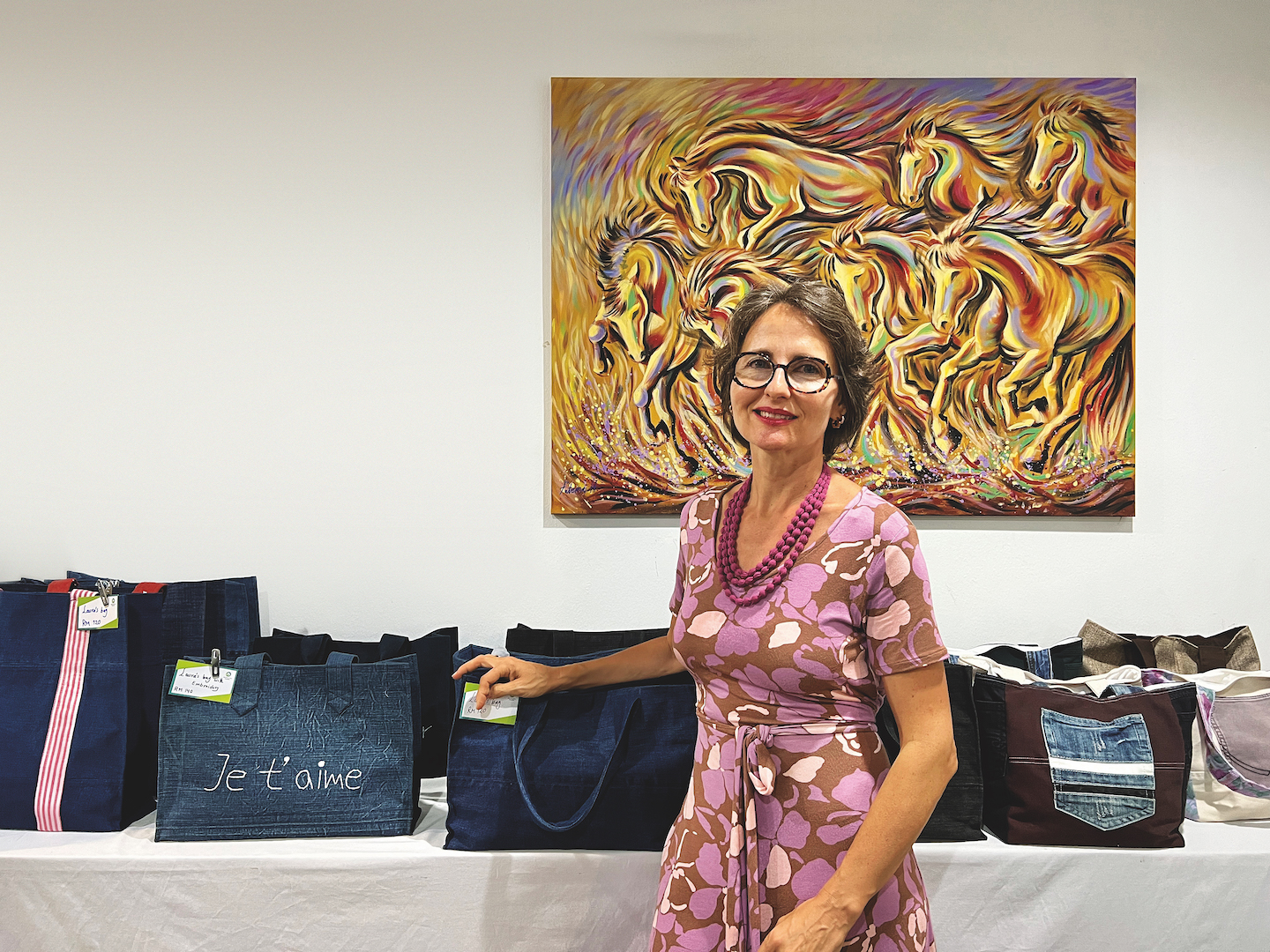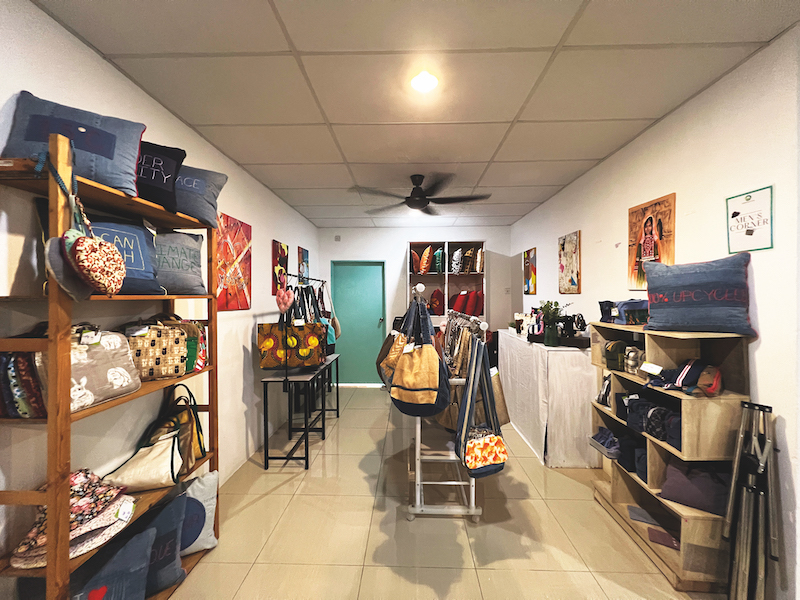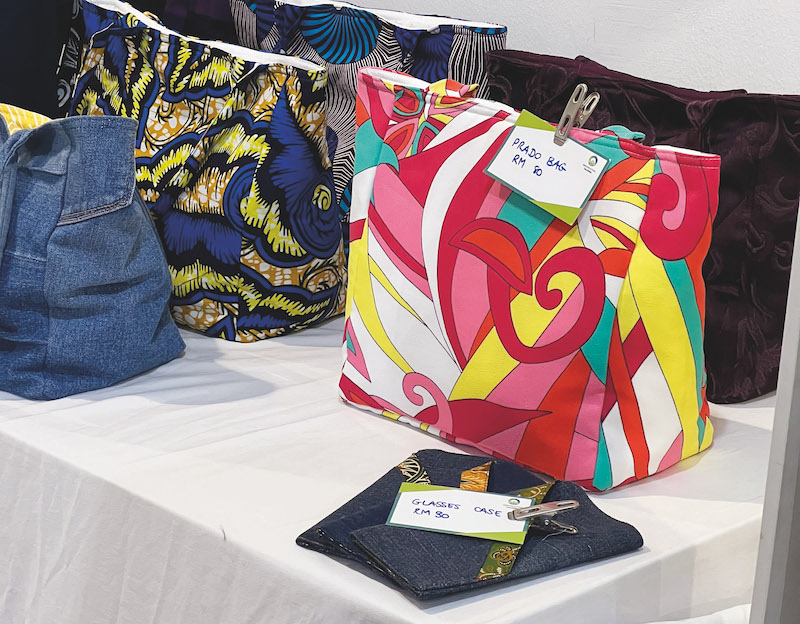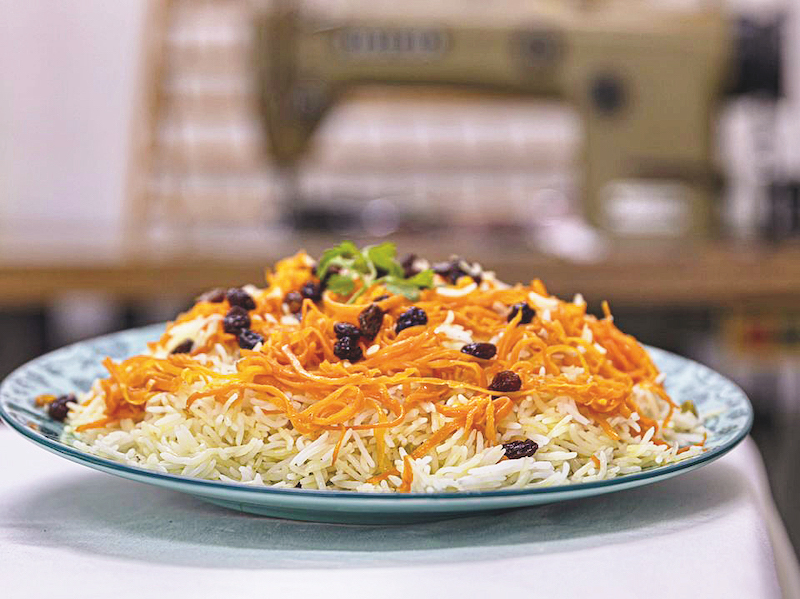
Founder Julie Das was a French teacher at an international school before giving up her career to focus on this project (All photos: Aireena Azni/The Edge)
At the height of the Covid-19 pandemic, many struggled to adapt to changes that were sprung upon us. It was even worse for the refugees who sought shelter in our country. “They came here empty-handed, completely in a dire situation. With the pandemic, there were absolutely no resources for them. Men lost their jobs and women fell into depression as their children were no longer in school (or at learning centres). They were just at home waiting for better days,” says Julie Das, founder of the non-profit organisation Greater Action.
An altruist and problem-solver, Julie could not just stay silent after reaching out to a group of marginalised Afghan women and learning about their devastating circumstances. She knew she needed to do something more sustainable than just collecting and distributing food to the community. “Once you hear their stories, you can’t look back. For me, refugee or not, they’re all humans. I have a lot of compassion. But I’m also an action person who will always find a solution. I just can’t believe there’s no solution for any problem.”
Armed with her humanitarian experience in Kolkata, India, and Yangon, Myanmar, Julie set up Greater Action in March 2020, the same month Malaysia announced its first nationwide lockdown. “If I took some time, used common sense and experience from my previous projects, I knew
I could do something to help them.”
To start, she dug into the aspect most people would overlook, which is mental health. “First of all, they need to be stable in their heads. They come with trauma from Afghanistan. When they are here, they are faced with another trauma as they realise, ‘Oh, I’m in a country where I’m not able to work legally, can’t send my kids to school and have very limited access to healthcare. How can I survive?’”
She reached out to psychologists but was not able to find those who were willing to offer pro bono consultations.
img_8407.jpg

“I was an excellent yoga instructor in my younger days and so I thought about the things I did that helped with my mental and emotional distress, which were breathing, meditation and mindfulness. I started by making sure those women were listened to.”
A lot of counselling sessions were done online. Although it was hard to recruit volunteers in the beginning, Greater Action’s mental health unit now comprises 10 professionals, most of whom are hypnotherapists. “Hypnotherapy works very well to process the refugees’ traumatic experiences.”
Another problem Julie needed to tackle was children withdrawing from school due to financial constraints. “They couldn’t afford it, even though the monthly fee was only about RM150. So I searched for learning centres run by Malaysians that offer quality education. Currently, we are sponsoring
125 kids.”
As an educator — Julie was a French teacher at an international school before giving up her career to focus on this project — she stresses the importance of education. “Without it, you can’t make a living. Now, even if they are resettled or stay on in this country, they will already have a strong foundation and a better future.” The organisation works with Hilla and Afghan Learning Centre, which are located near Greater Action’s premises in Bandar Baru Ampang, Kuala Lumpur, to provide the children with fundamental education.
Meanwhile, the mothers are being taught basic Malay and English. “It’s for them to get by in day-to-day situations — if they go to the doctor, for example. It’s essential to speak some Malay because they are going to be here for 10 years, if not forever. Only 2% of the refugee community will be resettled in a third country; the rest will remain here for a long time. Living in a country where you don’t speak the language will be complicated.”
Next on Julie’s agenda was to find out the women’s skills and abilities in order to come up with suitable training and job opportunities for them. “They are very talented. It’s so frustrating because they are so good at manual work. But obviously, no one knows about it. That’s the reason for Greater Action. We need a window to showcase what they can do.”
img_8413.jpg

Three sustainable need-based programmes implemented by the organisation include tailoring, Afghan cooking and French baking. For each of these projects, the women are trained by professionals to either learn a skill from scratch or refine and enhance their knowledge. The ultimate goal is to make them financially independent.
“Some of them can cook and sew but they require more training. If you see the dresses we made three years ago, you couldn’t even wear them. But we had ladies who knew how to use the sewing machine, so we just needed to give them additional coaching. What’s important for me is attitude and interest in learning. It’s not how much you know.
“We have one lady who needs sponsorship for her kids’ education so she is making necklaces. When she first came in, she obviously had no idea how to create the accessories. But I could see that she was very patient and eager to learn. If you have the right attitude towards learning and you want to be part of another family helping each other, then you are welcome here. Now, she is able to make money and she has trained another woman who is also earning a living from it.”
Different kinds of products have been produced by the refugees, including a variety of bags such as totes, slings and pouches; laptop sleeves; cushion covers; passport holders; and unique string necklaces. “They are paid by piece — whether the item is sold or not, I pay them. This is my rule.”
All offerings are upcycled and handcrafted using discarded materials collected throughout the year from international schools, universities or individuals who want to give away old clothes or donate any kind of fabric such as denim, curtains, towels, table runners, quilts and ethnic wear.
In line with Julie’s mission to put the spotlight on the refugees’ talent and identity, they provide catering services featuring Afghan cuisine such as koftas, Borani Banjan, Kabuli pulao and Bolani. “The recipes are brought from their homeland but we train them to prepare fresh meals using the best ingredients and following the highest standards of hygiene. Our catering is growing quite fast and Afghan food is not so competitive here.”
There are concerns among clients who point out that the food prices are slightly higher than average. “It’s authentic, flavourful, not too spicy and fresh. I said to my Malaysian friends that we use good oil and ingredients. You can get cheaper fast food elsewhere, but that’s not how I want to feed my customers. So our price may be a bit expensive, but that’s because we use good ingredients and we don’t recycle oil,” Julie remarks, adding that currently her patrons are mainly expatriates or people who are health conscious.
img_9531.jpg

The work at Greater Action is divided among several people. Those handling large reservations, which can cater for up to 300 people, operate at the centre where they source and prepare ingredients and cook in the assigned kitchen. Smaller orders are prepared at home. “We work with companies as well for CSR (corporate social responsibility), corporate or VIP lunches or social events. We can also host a private lunch or tea party here.”
Julie says they are not limiting themselves to just Afghan food. They also offer baked goods as well as delicacies from Jordan, the US and Scotland. “We have French pastry chefs who train them and we have Malaysian, Jordanian, Palestinian and Pakistani volunteers helping us in the kitchen. We welcome good cooks looking to spend meaningful time teaching the refugees some new skills.”
To date, the ladies can make a variety of French pastries, madeleines, financiers and tarts. Besides all the knowledge learnt, they are also able to manage most of the catering processes by themselves. “They’ve been trained to communicate with the customers to arrange for delivery and seek feedback. Some of them don’t even speak English. Still, they can do all that, thanks to Google Translate.”
There are currently 10 tailors, seven cooks and bakers at Greater Action, and they have had more than 150 volunteers lend a hand throughout every programme for the past 3½ years. “The number of people we need to help is getting bigger, so we need more people to know about us because we have more ladies who want to be trained.”
Besides mental health consultations, education, skills training and job opportunities, Greater Action also offers assistance in the form of baby essentials and delivery costs, medical needs, home appliances and furniture to the Afghan refugees. Even though the initiative is female-focused, it also extends its hand to men who have family connections with the women. They are especially particular about mental health issues. “You don’t want them to misbehave at home. So obviously, this unit is open to everyone.”
Although she wishes to help as many people as possible, she still needs to be realistic about funds as the organisation relies mostly on sales from catering services and tailoring products. “I always like to help the poorest of the poor — maybe single mums, those who have sick family members, large families or children who have been out of school for a long time.”
There is still so much to do within the community, Julie observes. “I just can’t have it when someone trusts me and shares their problems with me and it goes in one ear and out the other. I need to take action.” Sounds like Greater Action couldn’t have been more aptly-named then.
This article first appeared on Oct 23, 2023 in The Edge Malaysia.


